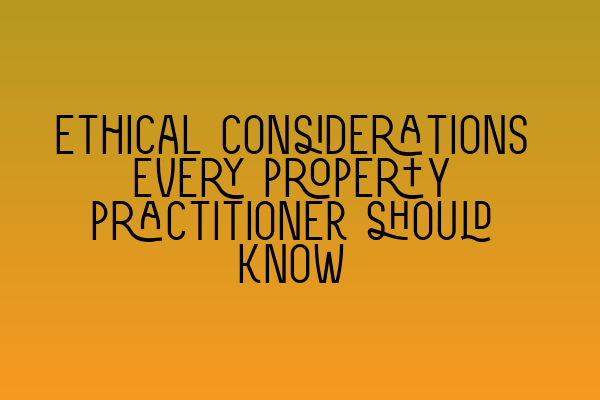# Ethical Considerations Every Property Practitioner Should Know
As a property practitioner, it is crucial to not only have a deep understanding of property law and land law, but to also be aware of the ethical considerations that come with the territory. Ethical behavior is not only a moral obligation, but it also helps to maintain the integrity and reputation of the legal profession. In this blog post, we will discuss some of the key ethical considerations that every property practitioner should adhere to.
## Upholding Client Confidentiality
One of the fundamental ethical obligations of a property practitioner is to maintain client confidentiality. This means that any information shared by a client should be kept strictly confidential, unless the client gives express consent to disclose it. This principle ensures that clients feel comfortable sharing sensitive information with their legal advisors, knowing that their privacy will be protected. Remember, breaching client confidentiality can lead to severe consequences, including disciplinary action and legal liability.
## Avoiding Conflicts of Interest
Another important ethical consideration is avoiding conflicts of interest. As a property practitioner, you should ensure that you do not enter into any situation where your personal or professional interests could conflict with the interests of your client. This includes refraining from representing clients in matters where you have a personal or financial relationship with the opposing party. Before taking on a client, it is essential to conduct a thorough conflict check to identify any potential conflicts and take appropriate steps to address them.
## Providing Competent and Diligent Representation
Property practitioners have a duty to provide competent and diligent representation to their clients. This means staying up to date with the latest developments in property law and land law, as well as maintaining a high level of expertise in these areas. Continual professional development through ongoing education and training is crucial to ensure that you are equipped with the knowledge and skills necessary to effectively represent your clients. Remember, providing substandard representation not only harms your clients but also undermines the reputation of the legal profession as a whole.
## Acting in the Best Interest of the Client
Property practitioners have a fiduciary duty to act in the best interest of their clients. This means putting the client’s interests above any personal or financial considerations. When advising clients, it is essential to provide objective and honest advice, even if it may not be what the client wants to hear. This principle ensures that clients make informed decisions based on accurate information and protects them from potential harm. Remember, always act in the best interest of the client, even if it means losing the deal or the client’s satisfaction in the short term.
## Avoiding Unlawful or Unethical Conduct
Property practitioners must always conduct themselves in a lawful and ethical manner. This includes refraining from engaging in any activities that could be considered dishonest, fraudulent, or unethical. It is important to adhere to the Solicitors Regulation Authority (SRA) Code of Conduct and any other relevant professional codes or guidelines. By doing so, you protect your clients, maintain the integrity of the legal profession, and avoid potential disciplinary action or legal consequences.
## Conclusion
Ethical considerations play a crucial role in the practice of property law and land law. Upholding client confidentiality, avoiding conflicts of interest, providing competent and diligent representation, acting in the best interest of the client, and avoiding unlawful or unethical conduct are all critical responsibilities of property practitioners. By prioritizing ethical behavior, you not only fulfill your professional obligations but also contribute to the trust and credibility of the legal profession.
For more information on preparing for the SQE exams, check out these related articles:
– [SQE 1 Practice Exam Questions](https://fqps.co.uk/sqe/sqe1-preparation/mcq-practice-quiz)
– [SQE 1 Practice Mocks FLK1 FLK2](https://fqps.co.uk/sqe/sqe1-preparation/practice-mocks-quiz)
– [SQE 2 Preparation Courses](https://fqps.co.uk/sqe/sqe2-preparation)
– [SQE 1 Preparation Courses](https://fqps.co.uk/sqe/sqe1-preparation)
– [SRA SQE Exam Dates](https://fqps.co.uk/sqe/sqe1-sqe2-exam-dates)
Remember, a property practitioner’s commitment to ethical behavior is not just a requirement, but an essential aspect of providing a trustworthy and reliable service to clients.
